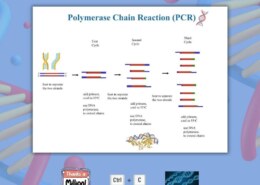PCR stands for polymerase chain Reaction. It will amplify the specific segment of the DNA that makes a million copies of DNA molecule. This technique is widely employed in the areas of molecular biology, research and diagnostic. It has three following steps: This process is carried in a thermocyclerRead more
PCR stands for polymerase chain Reaction. It will amplify the specific segment of the DNA that makes a million copies of DNA molecule. This technique is widely employed in the areas of molecular biology, research and diagnostic.
It has three following steps: This process is carried in a thermocycler, which is a machine that can rapidly heat and cool samples.
Denaturation:
The DNA sample is heated up to (95 deg Celsius), which causes the double stranded DNA separated into single strands.
Annealing:
Primers must be added to the complementary sequence of the targeted DNA fragment. primers are short pieces of single-stranded DNA that are specific for the sequence we want to amplify. In this step, the temperature must be lowered into (50-60 deg C). It allows the primers to anneal or bind to the complementary sequence of the DNA.
Extension:
DNA polymerase enzyme should be added to the DNA fragment so that it will extends the primers, synthesizing a new DNA strand complementary to the target DNA fragment. The temperature is raised into around 72 deg C.
These steps (1-3) are repeated for the many cycles to get the increased amount of the amplified target DNA fragment.
Applications:
DNA cloning:
PCR can be used to create copies of genes or DNA that can be inserted into plasmid or vector for future manipulation.
Genetic testing:
PCR can be used to detect mutations in genes, which can be helpful in diagnosing genetic diseases.
DNA sequencing:
PCR is often used to amplify DNA fragments before they are sequenced.
Forensic science:
PCR can be used to analyze DNA evidence from crime scenes.
COVID-19 testing:
RT-PCR is the most common type of test used to diagnose COVID-19. It detects the presence of viral RNA in a patient’s respiratory sample.
See less


Definition Monoclonal antibodies are the type of antibodies produced by the same clone of B cells against a specific antigen. Production 1. A mice is injected with the antigen against which the antibody is to be produced. 2. The B cells of the mice start producing antibodies against the antigen. 3.Read more
Definition
Monoclonal antibodies are the type of antibodies produced by the same clone of B cells against a specific antigen.
Production
1. A mice is injected with the antigen against which the antibody is to be produced.
2. The B cells of the mice start producing antibodies against the antigen.
3. These antibody producing B cells are selected. B cells are mortal and antibody producing cells. They undergo de novo and salvage pathway to produce DNA.
4. HGPRT negative Myeloma cells are selected which are immortal and cancer causing. They undergo de novo pathway for DNA synthesis and HGPRT inhibits the salvage pathway.
5. Myeloma cells and B cells are fused to produce hybridoma cells.
6. Hybridoma cells are then screened using HAT medium (HAT is an inhibitor of de Novo pathway).
7. The B and myeloma cells die due to finite cell division and lack of DNA synthesis respectively in HAT medium.
8. Hybridoma cells survive in HAT medium which are immortal and antibody producing.
9. These hybridoma cells are amplified and used to produce monoclonal antibodies against a specific antigen.
10. The monoclonal antibodies are then screened and packed in bottles for public use.
Uses:
Monoclonal antibodies are widely used in biotechnology such as
1. They are used in research field to study about biological processes.
2. They are widely used in diagnosis of many diseases and antigens.
3. They are commonly used in treating many diseases like cancer and autoimmune diseases.
See less